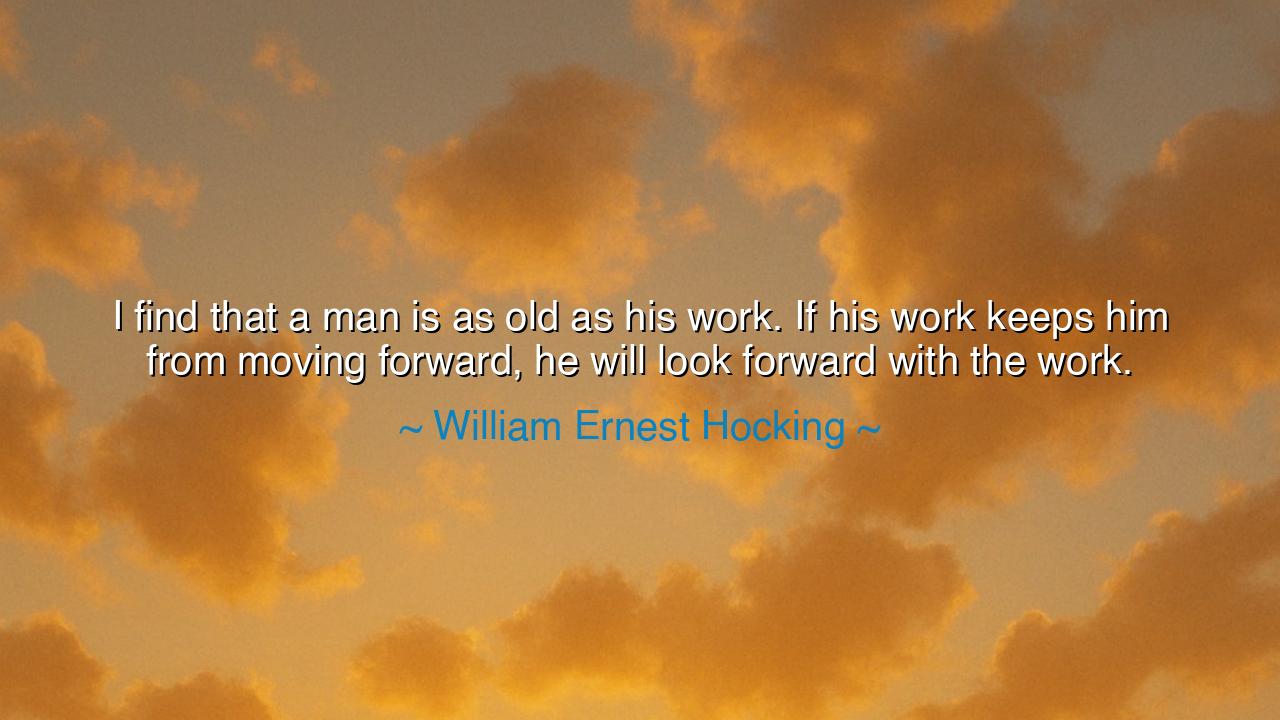
I find that a man is as old as his work. If his work keeps him
I find that a man is as old as his work. If his work keeps him from moving forward, he will look forward with the work.






"I find that a man is as old as his work. If his work keeps him from moving forward, he will look forward with the work." These words, spoken by the wise William Ernest Hocking, echo a profound truth—a truth that transcends time and circumstance. The work of a man is not merely the tasks he performs, but the very essence of his being. It is the crucible in which his soul is tested, shaped, and defined. In the vigor of youth, one is eager to create, to build, to transform the world. But as the years stretch on, it is not just the passing of time that shapes the man, but how his work evolves with him. If a man clings to the work of his past, unwilling to change, to grow, he will be bound to the past, his eyes fixed not on the future, but on the shadows of what he has already done.
The work we choose, O children of the earth, is a reflection of our soul’s deepest yearnings. In youth, we are full of ambition, our hearts set on creating something that will stand the test of time. But age—that slow, inevitable companion—asks more of us than simply the accumulation of work. It asks us to reflect, to ask: Has our work become a weight that holds us down, or does it continue to propel us forward, challenging us to grow and evolve? If we find ourselves unable to move beyond what we have already created, we risk becoming prisoners of our own work, living not in the present, but in the shadows of past achievements.
Consider the mighty Leonardo da Vinci, whose life was filled with masterpieces of art, invention, and discovery. In his youth, his work was revolutionary, as he sought to understand the mysteries of the world. But as the years passed, Leonardo found himself in a constant state of reflection, his work ever in pursuit of something more perfect, more profound. He was not content to rest on the laurels of his past achievements, and his creativity continued to evolve, even as his body aged. He refused to let his work become a hindrance, but rather used it as a means to drive himself forward, always seeking to transcend his own boundaries. Leonardo's life is a testament to the truth that work must continue to evolve, for it is through the pursuit of new horizons that a man remains young in spirit.
In contrast, consider the fate of the emperor who clings to his old ways, refusing to adapt to the changing world around him. History is filled with rulers and leaders who, after securing power, fell victim to the trap of their own work. The philosopher-king Marcus Aurelius, while a great ruler and Stoic philosopher, faced the challenge of reconciling his duties with the evolving needs of his people. Though his work was grounded in wisdom, it was often a burden, as the demands of ruling an empire left him little room for personal growth. And yet, in his Meditations, Marcus reminds us that a man must seek progress, must seek to grow even in the midst of his work, for otherwise, he will be trapped by the very structure he has built.
Hocking’s wisdom offers us a stark warning: if we allow our work to become an anchor, weighing us down, we will lose the freedom to move forward. The soul must remain flexible, willing to evolve with the passage of time. A man who is trapped by his own past achievements will never taste the sweetness of new discoveries, new ideas, or new adventures. He will live in a world of his own creation, staring at the same walls, unable to step beyond the confines of his own making.
And so, the lesson, O children of wisdom, is clear: do not allow your work to imprison you. Embrace it, nurture it, but always let it serve as a means of growth and renewal. Whether you are an artist, a scholar, a builder, or a philosopher, your work must continue to challenge you, to push you beyond what you have already achieved. When work ceases to be a source of progress, it becomes a weight, and the soul becomes old. But when work is a vessel of innovation and exploration, it keeps the spirit youthful, eager, and engaged in the endless unfolding of possibility.
Take heed, O seekers of truth, as you walk the path of life. Work with purpose, work with passion, but always allow room for the evolution of your craft. Let your work be a guide that lifts you, not a burden that holds you. Only by continuing to grow, by continually looking forward to new horizons, can you ensure that you will remain young at heart, no matter the years that pass. The true test of a man’s life is not found in his accomplishments alone, but in his ability to move beyond them, to transcend the limits of his past and reach for the boundless future.






AAdministratorAdministrator
Welcome, honored guests. Please leave a comment, we will respond soon